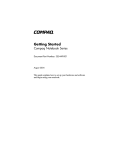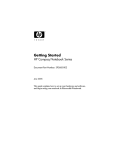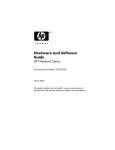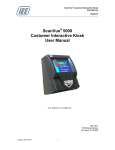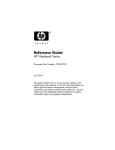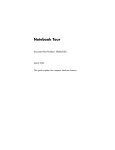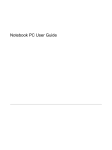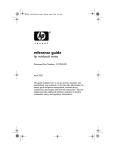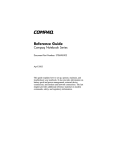Download HP tc4200 Getting Started Guide
Transcript
Getting Started HP Compaq Tablet PC Series Document Part Number: 367427-001 March 2005 This guide explains how to set up your hardware and software and begin using your tablet PC. Enhanced for Accessibility. © 2005 Hewlett-Packard Development Company, L.P. Microsoft and Windows are U.S. registered trademarks of Microsoft Corporation. Bluetooth is a trademark owned by its proprietor and used by Hewlett-Packard Company under license. The information contained herein is subject to change without notice. The only warranties for HP products and services are set forth in the express warranty statements accompanying such products and services. Nothing herein should be construed as constituting an additional warranty. HP shall not be liable for technical or editorial errors or omissions contained herein. Getting Started HP Compaq Tablet PC Series First Edition March 2005 Reference Number: tc4200 Document Part Number: 367427-001 Contents 1 Hardware Setup Step 1: Identify the Setup Hardware . . . . . . . . . . . . . . . . 1–2 Step 2: Insert the Battery Pack . . . . . . . . . . . . . . . . . . . . . 1–3 Step 3: Connect the Modem . . . . . . . . . . . . . . . . . . . . . . . 1–4 Connecting the Modem to an RJ-11 Jack . . . . . . . . . 1–5 Step 4: Connect the Tablet PC to External Power . . . . . . 1–7 Step 5: Open the Tablet PC . . . . . . . . . . . . . . . . . . . . . . . 1–8 Rotating the Display . . . . . . . . . . . . . . . . . . . . . . . . . 1–8 Step 6: Turn On the Tablet PC . . . . . . . . . . . . . . . . . . . . 1–12 2 Software Setup Welcome to Windows . . . . . . . . . . . . . . . . . . . . . . . . . . . Select Your Regional Preferences . . . . . . . . . . . . . . . . . . Accept the License Agreements. . . . . . . . . . . . . . . . . . . . Name Your Tablet PC . . . . . . . . . . . . . . . . . . . . . . . . . . . Register Online. . . . . . . . . . . . . . . . . . . . . . . . . . . . . . . . . Create User Accounts. . . . . . . . . . . . . . . . . . . . . . . . . . . . Press the Finish Button. . . . . . . . . . . . . . . . . . . . . . . . . . . 2–2 2–4 2–5 2–6 2–7 2–8 2–8 3 Next Steps Enable or Disable TouchPad Tapping . . . . . . . . . . . . . . . Protect Your Tablet PC . . . . . . . . . . . . . . . . . . . . . . . . . . Protect the Tablet PC from Viruses . . . . . . . . . . . . . . Protect Your System Files . . . . . . . . . . . . . . . . . . . . . Protect Your Privacy . . . . . . . . . . . . . . . . . . . . . . . . . Updating Software . . . . . . . . . . . . . . . . . . . . . . . . . . . Getting Started 3–2 3–3 3–4 3–5 3–6 3–6 iii Contents Protect the Tablet PC from Power Surges . . . . . . . . . 3–7 Use the Tablet PC Safely. . . . . . . . . . . . . . . . . . . . . . 3–8 Turn Off the Tablet PC Properly . . . . . . . . . . . . . . . . 3–9 Connect to the Internet . . . . . . . . . . . . . . . . . . . . . . 3–10 Access the User Guides . . . . . . . . . . . . . . . . . . . . . . . . . 3–13 4 Component ID Keyboard Components. . . . . . . . . . . . . . . . . . . . . . . . . . . Front Components . . . . . . . . . . . . . . . . . . . . . . . . . . . . . . Rear Components . . . . . . . . . . . . . . . . . . . . . . . . . . . . . . . Left-Side Components . . . . . . . . . . . . . . . . . . . . . . . . . . . Right-Side Components . . . . . . . . . . . . . . . . . . . . . . . . . . Display Components . . . . . . . . . . . . . . . . . . . . . . . . . . . . Bottom Components. . . . . . . . . . . . . . . . . . . . . . . . . . . . . Pen Components. . . . . . . . . . . . . . . . . . . . . . . . . . . . . . . . Labels . . . . . . . . . . . . . . . . . . . . . . . . . . . . . . . . . . . . . . . . 4–2 4–3 4–3 4–4 4–4 4–5 4–6 4–7 4–8 A Troubleshooting Quick Troubleshooting. . . . . . . . . . . . . . . . . . . . . . . . . . . A–2 Power Features . . . . . . . . . . . . . . . . . . . . . . . . . . . . . A–2 Can the Tablet PC Not Be Turned On? . . . . . . . . . . . A–3 Is the Tablet PC Screen Blank? . . . . . . . . . . . . . . . . . A–4 Is Software Functioning Abnormally? . . . . . . . . . . . A–5 Is the Tablet PC Unresponsive?. . . . . . . . . . . . . . . . . A–6 Is the Tablet PC Overheating?. . . . . . . . . . . . . . . . . . A–6 Is an External Device Not Working?. . . . . . . . . . . . . A–7 Help and Support Center . . . . . . . . . . . . . . . . . . . . . . . . . A–8 Contact Customer Care . . . . . . . . . . . . . . . . . . . . . . . . . . A–9 Preparing to Call Customer Care. . . . . . . . . . . . . . . . A–9 Contacting Customer Care by E-mail or Telephone . . . . . . . . . . . . . . . . . . . . . . . . . . . . . . A–10 Taking the Tablet PC to a Service Partner . . . . . . . A–10 iv Getting Started Contents B System Restore Safeguarding Your Data. . . . . . . . . . . . . . . . . . . . . . . . . . Altiris Local Recovery . . . . . . . . . . . . . . . . . . . . . . . . . . . Setting System Restore Points . . . . . . . . . . . . . . . . . . . . . Repairing or Reinstalling Applications . . . . . . . . . . . . . . Reinstalling Applications from Your Hard Drive . . . Reinstalling Applications from Discs . . . . . . . . . . . . Repairing the Operating System . . . . . . . . . . . . . . . . . . . Reinstalling the Operating System. . . . . . . . . . . . . . . . . . Reinstalling Device Drivers and Other Software. . . . . . . Updating Reinstalled Software . . . . . . . . . . . . . . . . . . . . B–2 B–2 B–3 B–4 B–4 B–5 B–5 B–6 B–8 B–8 Index Getting Started v 1 Hardware Setup During hardware setup, you will 1. Identify the hardware required for setup. 2. Insert the battery pack into the tablet PC, so the battery can begin to charge as soon as the tablet PC is connected to external power. 3. Connect the modem, so you will be able to register the tablet PC and operating system during software setup. 4. Connect the tablet PC to external power. 5. Open the tablet PC. 6. Turn on the tablet PC. When the tablet PC is turned on, you will be prompted to begin software setup. Ä CAUTION: To prevent file corruption and ensure that the correct drivers are installed: ■ Do not set up the tablet PC for the first time while the tablet PC is docked in an optional Expansion Base. (The Expansion Base can be used only with select models.) ■ During the hardware and software setup procedures: ❏ Do not unplug the tablet PC from external power. ❏ Do not shut down the tablet PC or initiate standby or hibernation. ❏ Do connect your modem as instructed in “Step 3: Connect the Modem,” later in this chapter, but do not insert, remove, connect, or disconnect any other device, cable, or cord. Getting Started 1–1 Hardware Setup Step 1: Identify the Setup Hardware To set up the tablet PC for the first time, you need the tablet PC, the AC adapter 1, the power cord 2, and the battery pack 3. If you would like to use the modem to register your tablet PC and operating system during software setup, you will also need the modem cable 4. If you are connecting the modem cable in a country where RJ-11 telephone jacks are not standard, you will need the modem adapter 5 to connect the modem cable. (If you purchased the tablet PC in a country where RJ-11 jacks are not standard, a modem adapter specific to the country in which you purchased the tablet PC is included with the tablet PC.) cords, modem cables, and modem adapters vary in ✎ Power appearance by region and country. Battery packs vary by model. 1–2 Getting Started Hardware Setup Step 2: Insert the Battery Pack To insert the battery pack: ✎ Battery packs vary by model. 1. Turn the tablet PC upside down. 2. Slide the battery pack 1 into the battery bay until it is seated. 3. Press the battery pack 2 into the tablet PC until it clicks into place. Ä CAUTION: To prevent a lack of response when you turn on the tablet PC at “Step 6: Turn On the Tablet PC,” make sure the battery pack is firmly seated. Getting Started 1–3 Hardware Setup Step 3: Connect the Modem To connect the modem so that you can register your tablet PC and operating system during software setup: ■ Follow the instructions in this section for connecting the modem to an analog telephone line. – or – ■ Follow the instructions provided by your Internet service provider to connect the tablet PC to the Internet through a DSL (Digital Subscriber Line) modem, cable modem, or network connection. For more information about these and other Internet connection methods, refer to the “Connect to the Internet” section in Chapter 3, “Next Steps.” be easier to connect your modem to a telephone line ✎ Itnowmight and set up other Internet connections later, after you have completed software setup. Jacks for analog telephone lines vary by country. ■ If you are connecting the modem to a telephone line in a country where RJ-11 telephone jacks are standard, follow the instructions in the “Connecting the Modem to an RJ-11 Jack” section next in this chapter. ■ If you are connecting the modem to a telephone line in a country where RJ-11 telephone jacks are not standard, follow the instructions in the “Connecting the Modem with an Adapter” section later in this chapter. Å 1–4 WARNING: To reduce the risk of electric shock, disconnect the modem from the telephone network before accessing an internal compartment of the tablet PC. Internal compartments include the memory compartment, the battery bay, and the hard drive bay. Getting Started Hardware Setup Connecting the Modem to an RJ-11 Jack To connect the modem to an analog telephone line that has an RJ-11 telephone jack: wall jacks and modem cables vary in appearance by ✎ Telephone region and country. 1. Turn the tablet PC display-side up on a flat surface near an RJ-11 telephone wall jack. 2. If your modem cable has noise suppression circuitry 1, which prevents interference with TV and radio reception, orient the circuitry end of the cable toward the tablet PC. avoid the risk of electric shock, fire, or damage to the Å To equipment, do not plug a modem cable into a network jack. 3. Plug the modem cable into the RJ-11 (modem) jack 2 on the tablet PC. 4. Plug the other end of the modem cable into the RJ-11 telephone wall jack 3. Getting Started 1–5 Hardware Setup Connecting the Modem with an Adapter To connect the modem to an analog telephone line that does not have an RJ-11 telephone jack: cables, modem adapters, and telephone wall jacks vary in ✎ Modem appearance by region and country. 1. Turn the tablet PC display-side up on a flat surface near a telephone wall jack. 2. If the modem cable has noise suppression circuitry 1, which prevents interference with TV and radio reception, orient the circuitry end of the cable toward the tablet PC. 3. Plug the modem cable into the RJ-11 (modem) jack 2 on the tablet PC. 4. Plug the modem cable into the country-specific modem adapter 3. 5. Plug the country-specific modem adapter into the telephone wall jack 4. 1–6 Getting Started Hardware Setup Step 4: Connect the Tablet PC to External Power To connect the tablet PC to external AC power: cords and electrical outlets vary in appearance by region ✎ Power and country. 1. Plug the AC adapter into the power connector 1. 2. Plug the power cord into the AC adapter 2, and then into an AC outlet 3. When the tablet PC receives AC power, the battery pack begins to charge and the battery light 4 (on the front of the tablet PC) is turned on. When the battery pack is fully charged, the battery light is turned off. It is recommended that you leave the tablet PC connected to external power until the battery pack is fully charged and the battery light is turned off. (A partially charged new battery pack can run the tablet PC after software setup is complete, but battery charge displays will not be accurate until the new battery pack has been fully charged.) Getting Started 1–7 Hardware Setup Step 5: Open the Tablet PC To open the tablet PC: 1. Press the display release button 1 to open the display. 2. Raise the display 2. Rotating the Display The tablet PC display can rotate from notebook mode to tablet mode. the tablet PC is docked in either notebook mode or ✎ When tablet PC mode, the display will not rotate. 1–8 Getting Started Hardware Setup Tablet PC Mode To change the tablet PC from notebook mode to tablet PC mode: 1. Rotate the tablet PC display clockwise until is snaps into place facing away from the keyboard. 2. Tilt the tablet PC display downward onto the keyboard until it snaps into place. Getting Started 1–9 Hardware Setup Notebook Mode To change the tablet PC from tablet PC mode to notebook mode: 1. Press the display release button. 2. Open the tablet PC display. 1–10 Getting Started Hardware Setup 3. Rotate the tablet PC display counterclockwise until it snaps into place facing the keyboard. Getting Started 1–11 Hardware Setup Step 6: Turn On the Tablet PC Ä CAUTION: To prevent a lack of response when you turn on the tablet PC, make sure the battery pack is firmly seated. To turn on the tablet PC: » Slide the power switch 1 toward the front of the tablet PC. The power/standby light 2 is turned on, and you are prompted to begin software setup. power/standby light is visible when the tablet PC is open or ✎ The closed. 1–12 Getting Started 2 Software Setup During software setup you can ■ Select regional preferences. ■ Accept license agreements. ■ Name your tablet PC. ■ Register online. ■ Create user accounts. If you prefer not to register your tablet PC during software setup, you can do so at any time after software setup is complete. You can also change or add any settings you select or skip during the setup process. Although you can register and set preferences later, it is usually easier and faster to complete these tasks during software setup. Software setup begins when you respond to the setup prompt on the tablet PC screen. Ä CAUTION: If you are prompted to select an operating system language before a window called Welcome to Microsoft Windows is displayed, choose carefully. On some models, the languages that you do not choose are deleted from the system and cannot be restored during software setup. ■ After you respond to the setup prompt, you must complete the entire setup process without interruption. Setup time varies. ■ During software setup, it is normal for some tablet PC models to pause occasionally for several minutes. These normal pauses are indicated by an hourglass icon. Getting Started 2–1 Software Setup Welcome to Windows The first window in software setup is Welcome to Microsoft Windows. This window welcomes you to your Microsoft® Windows® operating system and introduces you to software setup navigation: ■ To display additional information about the text in any setup window: Select the question mark icon in the lower-right section of the window or press the f1 key on your keyboard. ■ To continue to the next window: Select the Next button in the lower-right corner of the window. ■ To return to the previous window: Select the Back button in the lower-left corner of the window. (This button is unavailable on the first window, Welcome to Microsoft Windows.) ■ To skip a window without entering a preference: Select the Skip button in the lower-right corner of the window. (This button is unavailable on the first and some succeeding windows.) 2–2 Getting Started Software Setup To navigate in a window, slide your finger on the TouchPad 1 in the direction that you want to move the cursor. To select an item, move the cursor over the item, and then press the left TouchPad button 2. Getting Started 2–3 Software Setup Select Your Regional Preferences The next 2 windows prompt you to confirm or select regional preferences. Regional preferences are preset for the country in which you purchased the tablet PC. ■ Dates and currency window—The operating system will use the region and language preferences you confirm or select in the How should dates and currency appear? window to format dates and currency. Notice that some languages have regional versions. The versions are shown in parentheses after the language name. ■ Time zone window—The operating system will use the time zone you confirm or select in the What time zone are you in? window to set the tablet PC clock. Notice that you can select a check box to set the tablet PC clock to adjust to daylight saving time. 2–4 Getting Started Software Setup Accept the License Agreements In the End-User License Agreement window, you must accept both the Microsoft End-User License Agreement and the HP Software Product License Agreement to continue with software setup. ■ To accept both agreements: Select Yes, I accept them, and then select Next. ■ To decline both agreements: Select No, I don’t accept them, and then select Next. If you decline both agreements, you will not be permitted to use the installed software. On the following screen you will be offered only 2 options: You can choose Back to return to the End-User License Agreement window or choose Shutdown to turn off the tablet PC. When you start the tablet PC after selecting Shutdown, the Welcome to Windows window is displayed and you must again begin software setup. Getting Started 2–5 Software Setup Name Your Tablet PC If you plan to include your tablet PC on a home network, your tablet PC must have a unique name. In the What’s your computer’s name? window, you can retain the default name shown in the Computer name text field or choose another name. For example, you might want to base your tablet PC name on a person’s name, “David,” or a location, “Familyroom.” In order for your tablet PC name to be displayed on a network, the name ■ Must be no longer than 15 characters. ■ Must include only numerals (0-9), letters (A-Z and a-z), and hyphens. ■ Cannot include spaces. If you like, you can also enter a description of your tablet PC. The description may contain more characters than the tablet PC name, as well as spaces and special characters. For example, you could describe your tablet PC as “David’s game machine.” 2–6 Getting Started Software Setup In the Register Online with Hewlett-Packard window, you can ■ Register your tablet PC—Complete the text fields. ■ Register your operating system—Select the Also Register with Microsoft check box beneath the text fields. ■ Indicate how you would like to be contacted by Hewlett-Packard—Select or clear the check boxes above the Microsoft registration information. To view the Hewlett-Packard Registration Privacy Statement, select the underlined link near the top of the window. To view the Microsoft Windows Registration Privacy Statement, select the underlined link near the bottom of the window. To return to the registration window from either of these windows, select Back. To proceed with your registration and software setup, select Next. If you connected your modem during the “Step 3: Connect the Modem” section in Chapter 1, “Hardware Setup,” or have connected the tablet PC to the Internet by another method, the Connecting to online registration window is displayed. This window describes the progress of your registration. If you are unable to send your registration, you can do so at any time after software setup is complete. For more information about connecting to the Internet, refer to the “Connect to the Internet” section in Chapter 3, “Next Steps.” Getting Started 2–7 Software Setup Create User Accounts In the Who will use this computer? window, you can create a user account for each person who might use the tablet PC. User accounts enable each tablet PC user to create a personal tablet PC environment. A user’s environment might include such customizations as display and security settings, personal files, screen savers, and the appearance of the Windows desktop. When you turn on the tablet PC, a prompt to select a user account is displayed. When a user account is selected, Windows opens according to the preferences set by that user. The names you enter in the Who will use this computer? window text fields are displayed on the list of user accounts displayed at Windows startup. Press the Finish Button When the Thank you! window is displayed, read the text, and then select Finish. Your tablet PC saves your preferences, and then restarts in Windows. Select your user account, and you are ready to begin using your tablet PC. To protect your tablet PC and gain Internet access to software updates and online assistance, it is recommended that you begin your tablet PC use by following the suggestions in the next chapter. 2–8 Getting Started 3 Next Steps Before you use your tablet PC, make sure that you properly set up your tablet PC. Software on optical discs, such as CDs or DVDs, is included with all tablet PC models. Getting Started 3–1 Next Steps Enable or Disable TouchPad Tapping TouchPad Tapping is a TouchPad preference that enables you to tap the TouchPad once to select an item or twice to double-click an item. This feature is enabled by default. To enable or disable TouchPad tapping: 1. Use the TouchPad to select Start > Control Panel > Printers and Other Hardware > Mouse > Device Settings. Then select the Settings button. 2. Select Tapping. If the Enable Tapping check box is selected, TouchPad Tapping is enabled. ❏ To disable TouchPad Tapping, clear the check box. ❏ To enable TouchPad Tapping, select the check box. 3. Select OK. For information about setting other TouchPad preferences, refer to Chapter 3, “Pointing Devices and Keyboard,” in the Hardware and Software Guide. software instructions in your tablet PC documentation ✎ All describe Microsoft Windows XP Tablet PC Edition procedures based on the default Windows XP category view. For information about switching between Windows XP classic view and Windows XP category view, select Start > Help and Support > Customizing your computer > Files, folders, and programs > Use Windows classic folders. 3–2 Getting Started Next Steps Protect Your Tablet PC You can use the information in this section to ■ Protect your tablet PC from viruses. ■ Protect your tablet PC from power surges. ■ Protect your system files. ■ Protect your privacy. ■ Use your tablet PC safely. ■ Turn off your tablet PC properly. For information about other tablet PC security features, such as passwords, device disabling, and using an optional security cable lock, refer to Chapter 14, “Security,” in the Hardware and Software Guide. Getting Started 3–3 Next Steps Protect the Tablet PC from Viruses When you use the tablet PC for e-mail, network, or Internet access, you expose the tablet PC to computer viruses. Computer viruses can disable your operating system, applications, or utilities or cause them to function abnormally. Antivirus software can detect most viruses, destroy them, and in most cases, repair damage they have caused. To provide protection against newly discovered viruses, antivirus software must be updated. Norton AntiVirus software is preinstalled on your tablet PC. ■ For information about using and updating your Norton AntiVirus software: Select Start > All Programs > Norton AntiVirus > Help and Support. ■ For supplementary information about your Norton AntiVirus software, including troubleshooting procedures: Select Start > All Programs > Norton AntiVirus > Help and Support. For more information about computer viruses: 1. Select Start > Help and Support. 2. Type viruses in the Search text field. 3. Then press enter. 3–4 Getting Started Next Steps Protect Your System Files System Restore is an operating system feature that enables you to undo harmful changes to your tablet PC software by restoring your software to an earlier time, called a restore point, when your software was functioning optimally. Restore points are restorable, benchmark “snapshots” of your application, driver, and operating system files. The tablet PC sets restore points at regular intervals and might set additional restore points whenever you change your personal settings or add software or hardware. Manually setting additional restore points provides additional protection for your system files and settings. It is recommended that you manually set restore points ■ Before you add or extensively modify software or hardware. ■ Periodically, whenever the system is performing optimally. Restoring to any restore point does not affect your data files. For example, restoring your system software to an earlier time will not affect documents or e-mails that you saved after that time. All System Restore procedures are reversible. Setting a Restore Point To set a system restore point manually: 1. Select Start > Help and Support > System Restore. 2. Select Create a restore point, and then follow the instructions on the screen. Restoring to a Restore Point To restore the tablet PC to a restore point: 1. Make sure the tablet PC is connected to a reliable AC outlet through the AC adapter. 2. Select Start > Help and Support > System Restore. 3. Select Restore my computer to an earlier time, and then follow the instructions on the screen. Getting Started 3–5 Next Steps Protect Your Privacy When you use the tablet PC for e-mail, network, or Internet access, it is possible for unauthorized persons to obtain information about you, your tablet PC, and your data. To optimize the privacy protection features included with your tablet PC, it is recommended that you ■ Keep your Windows operating system updated. Many Windows updates contain security enhancements. For information about updating Windows, refer to the “Updating Software” section. ■ Use a firewall. A firewall is software that controls access to data and resources on the network. This protects your wireless network from intruders. Updating Software Most software, including the operating system, is updated frequently by the manufacturer or provider. Important updates to the software included with your tablet PC might have been released since the tablet PC left the factory. Some updates might affect the way your tablet PC responds to optional software or external devices. Many updates provide security enhancements. HP strongly recommends that you update the operating system and other software provided on your tablet PC as soon as the tablet PC is connected to the Internet. To update the operating system and other software provided on your tablet PC, » Select Start > Help and Support. For supplementary information and procedures for keeping your tablet PC software updated, refer to the software update section in the Hardware and Software Guide. 3–6 Getting Started Next Steps Protect the Tablet PC from Power Surges To protect the tablet PC from the power surges that might be caused by an uncertain power supply or an electrical storm: ■ Plug the tablet PC power cord into an optional, high-quality surge protector. Surge protectors are available from most computer or electronics retailers. ■ Provide surge protection on the cable that connects the modem to a telephone line. ■ During an electrical storm, either run the tablet PC on battery power or shut down the tablet PC and unplug the power cord. Getting Started 3–7 Next Steps Use the Tablet PC Safely Å WARNING: To reduce the risk of electric shock or damage to your equipment: ■ Plug the power cord into an AC outlet that is easily accessible at all times. ■ Disconnect power from the tablet PC by unplugging the power cord from the AC outlet (not by unplugging the power cord from the tablet PC). ■ If provided with a 3-pin attachment plug on your power cord, plug the cord into a grounded (earthed) 3-pin outlet. Do not disable the power cord grounding pin, for example; by using a 2-pin adapter. The grounding pin is an important safety feature. Å WARNING: To reduce the risk of serious injury, read the Safety and Comfort Guide. It describes proper workstation setup, and proper posture, health, and work habits for tablet PC users. The Safety and Comfort Guide also provides important electrical and mechanical safety information. This guide is available on the Web at http://www.hp.com/ergo, on the tablet PC hard drive, and in the Help and Support Center located on your tablet PC. Å WARNING: To avoid potential discomfort or burns, do not block the air vents or use the tablet PC on your lap for extended periods.The tablet PC is designed to run demanding applications at full power. As a result of increased power consumption, it is normal for the tablet PC to feel warm or hot when used continuously. The tablet PC complies with the user-accessible surface temperature limits defined by the International Standard for Safety of Information Technology Equipment (IEC 60950). For more safety and regulatory information refer to the Regulatory and Safety Notices guide. 3–8 Getting Started Next Steps Turn Off the Tablet PC Properly Whenever possible, turn off the tablet PC by using the standard Windows shutdown procedure for your operating system: » Select Start > Turn Off Computer > Turn Off. (If you connect your tablet PC to a network domain, the name of the Turn Off Computer button might change to Shut Down.) If the tablet PC does not respond, try the following shutdown procedures: ■ Press ctrl+alt+delete, and then select Shut Down > Turn Off. ■ If the tablet PC does not respond to the ctrl+alt+delete procedure, slide and hold the power switch for 4 seconds. Getting Started 3–9 Next Steps Connect to the Internet To connect the tablet PC to the Internet, you must enable your communication hardware and have an account with an Internet service provider (ISP). Enable Communication Hardware Your modem is enabled when the modem cable is connected to the tablet PC and to an analog telephone line. ■ If you connected the modem cable during hardware setup, your modem is enabled. Proceed to the next section, “Set Up Internet Service.” ■ If you did not connect the modem cable during hardware setup: a. Turn off your tablet PC. b. Follow the instructions in the “Step 3: Connect the Modem” section of Chapter 1, “Hardware Setup.” c. Start your tablet PC in Windows. d. Proceed to the next section, “Set Up Internet Service.” For information about setting up a wireless device, visit http://www.hp.com/go/wireless. For more information about modem, wireless, cable, DSL (Digital Subscriber Line), and network connections, select Start > Help and Support. The Help and Support Center provides hardware and software information, instructions, tutorials, and wizards that can help you set up or troubleshoot a variety of connections. 3–10 Getting Started Next Steps Set Up Internet Service You must set up Internet service before you can connect to the Internet. Your tablet PC includes software developed with leading ISPs in many locations to help you set up a new Internet account or to configure your tablet PC to use an existing account. Depending on your location, you might be able to set up Internet service by using the Easy Internet Sign-up utility or an ISP-provided icon on your desktop. In all locations, you can set up Internet service by using the Windows Internet Connection wizard. Using Easy Internet Sign-Up If the Easy Internet Sign-Up utility is supported in the country in which you purchased your tablet PC, you can access the utility by using either of the following methods: ■ Double-click the Easy Internet Sign-up icon on the desktop. – or – ■ Select Start > All Programs > Online Services > Easy Internet Sign-up. If the Easy Internet Sign-Up utility is available, you can use the utility to ■ Sign up for a new Internet account. ■ Configure your tablet PC to use an existing account. ■ If you plan to use a LAN, cable, or DSL Internet connection, you might need to contact your ISP for information about obtaining additional software or hardware. For more information about LAN, cable, or DSL Internet connections, select Start > Help and Support. If the Easy Internet Sign-Up utility is not available on your tablet PC, refer to the next sections, “Using an ISP-Provided Icon” and “Using the Internet Connection Wizard.” Getting Started 3–11 Next Steps Using an ISP-Provided Icon If ISP-provided icons are supported in the country in which you purchased your tablet PC, the icons might be displayed either individually on the Windows desktop or grouped in a desktop folder named Online Services. To set up a new Internet account or configure your tablet PC to use an existing account, double-click an icon, and then follow the instructions on the screen. Using the Internet Connection Wizard You can use the Windows Internet Connection wizard to connect to the Internet ■ If you already have an account with an ISP. ■ If you have a disc from an ISP. ■ If you do not have an Internet account and would like to select an ISP from the list provided within the wizard. (The list of ISP providers is not available in all regions.) ■ If you have selected an unlisted ISP and the ISP has provided you with such information as a specific IP address, and POP3 and SMTP settings. To access the Internet Connection wizard and instructions for using the wizard: 1. Select Start > Help and Support. 2. In the Search text field, type Make an Internet connection. 3. Then select Search. It is recommended that you select the check box provided within the wizard to enable Internet Connection Firewall. For more information about firewalls, refer to “Protect Your Privacy,” earlier in this chapter. 3–12 Getting Started Next Steps Access the User Guides User guides, reference manuals, and other support information for your tablet PC is available through the Help and Support Center or the Info Center, To access the user guides through the Help and Support Center: » Select Start > Help and Support > HP User Guides. To access the user guides through the Info Center: 1. Press the Info Center button. 2. Select HP User Guides. ✎ A User Guides CD is included with select tablet PC models. Getting Started 3–13 4 Component ID This chapter identifies the visible hardware components included with your tablet PC. Information about the function of the components is provided in the Hardware and Software Guide. of the hardware components illustrated and described in ✎ Some this chapter and in other tablet PC guides are available only on select models. Getting Started 4–1 Component ID Keyboard Components Components 1 Caps lock light - Right TouchPad button 2 Pointing stick q TouchPad scroll zone 3 Left pointing stick button w Right pointing stick button 4 TouchPad e Num lock light 5 Wireless light r Volume up button 6 Power/standby light t Volume down button 7 Battery charge light y Volume mute button 8 IDE (Integrated Drive Electronics) drive light u Volume mute light 9 Left TouchPad button i Presentation mode button 4–2 Getting Started Component ID Front Components Rear Components Components 1 Infrared port 6 RJ-45 (network) jack 2 Bluetooth® module (select models only) 7 Power connector 3 Display release button 8 External monitor port 4 USB port 9 S-Video-out jack 5 RJ-11 (modem) jack Getting Started 4–3 Component ID Left-Side Components Right-Side Components Components 1 Security cable slot 8 Audio-out (headphone) jack 2 Vent 9 Audio-in (microphone) jack 3 Wireless button - USB port (select models only) 4 USB port q PC Card eject button 5 Info Center button w PC Card slot 6 Power switch e Digital Media Slot 7 Speaker 4–4 Getting Started Component ID Display Components Components 1 Pen holder 5 Windows Security button 2 Pen eject button 6 Q button 3 Internal microphone 7 Rotate button 4 Jog dial 8 Tablet PC Input Panel Launch button Getting Started 4–5 Component ID Bottom Components Components 1 Docking connector 5 Primary battery release latch 2 Expansion memory module 6 Hard drive bay compartment 3 Vents (3) 7 Travel battery connector 4 Primary battery bay 4–6 Getting Started Component ID Pen Components Components 1 Pen tip 2 Pen button 3 Pen tether eyelet 4 Pen eraser Getting Started 4–7 Component ID Labels The labels affixed to the tablet PC provide information you might need when you troubleshoot system problems or travel internationally with the tablet PC. ✎ The appearance and position of labels varies by model. ■ Service Tag—Provides the product name, product number (P/N), and serial number (S/N) of your tablet PC. You might need the product number and the serial number when you contact Customer Care. The Service Tag label is affixed to the bottom of the tablet PC. To display the information on the Service Tag on your screen, select Start > Help and Support. ■ Microsoft Certificate of Authenticity—Contains the Windows Product Key. You might need the Product Key to update or troubleshoot the operating system. This certificate is affixed to the bottom of the tablet PC. ■ Regulatory label—Provides regulatory information about the tablet PC. The Regulatory label is affixed to the bottom of the tablet PC. ■ Modem Approval label—Provides regulatory information about the modem and lists the agency approval markings required by some of the countries in which the modem has been approved for use. You might need this information when traveling internationally. The Modem Approval label is affixed to the bottom of the tablet PC. ■ Wireless certification labels—Some tablet PC models include an optional WLAN device and/or an optional Bluetooth® device. If your tablet PC model includes one or more wireless devices, a certificate providing regulatory information about each device and the approval markings of some of the countries in which the device has been approved for use is included with your tablet PC. You might need this information when traveling internationally. Wireless certification labels are affixed to the bottom of the tablet PC. 4–8 Getting Started A Troubleshooting If you experience problems with your tablet PC, you can ■ Review the Quick Troubleshooting section in this appendix. ■ Access the Help and Support Center for additional information about your tablet PC. many checkup and repair features require an ✎ Although Internet connection, many other features can help you fix a problem while the tablet PC is offline. ■ Visit the HP support Web site at http://www.hp.com/support for answers to common questions. ■ Contact Customer Care for further assistance. Getting Started Guide A–1 Troubleshooting Quick Troubleshooting Power Features Several of the troubleshooting suggestions in this appendix refer to power features, which vary by tablet PC model. For example, some models have a power button and other models have a power/standby button or a power switch. Some models have one power/standby light, and other models have 2 power/standby lights. ■ The locations and functions of the power features on your tablet PC are identified in Chapter 4, “Component ID,” and in the Hardware and Software Guide. ■ The following illustration identifies the icons for a power button or power switch 1, a power/standby light 2, and an AC adapter light 3. A–2 Getting Started Guide Troubleshooting Can the Tablet PC Not Be Turned On? If an AC adapter light is off and the tablet PC cannot be turned on, adequate power might not be available to the tablet PC. ■ If the tablet PC is running on battery power or is connected to an external power source other than an AC outlet, connect the tablet PC to an AC outlet using the AC adapter. Make sure the power cord and AC adapter connections are secure. ■ Verify that the AC outlet is providing adequate power by plugging another electrical device into the outlet. When an AC adapter light is on, the tablet PC is receiving adequate AC power. If all power and power/standby lights are on, the tablet PC is on. If all power and power/standby lights are off, the tablet PC is off. If the tablet PC can be turned on when connected to external power but cannot be turned on when running on a battery pack, recharge the battery pack. For more information about running the tablet PC on battery power, refer to the Hardware and Software Guide. Getting Started Guide A–3 Troubleshooting Is the Tablet PC Screen Blank? If you have not turned off the tablet PC but the screen is blank, the tablet PC might be in standby or hibernation, or not set to display the image on the tablet PC screen. ■ To resume from standby or restore from hibernation, briefly slide the power switch. Standby and hibernation are energy-saving features that can be initiated by the system while the tablet PC is in Windows but is not in use. ❏ When standby is initiated, the power/standby lights blink, your work is saved in random access memory (RAM), and the screen clears. In some software, including your Windows operating system, the term standby is replaced by the term sleep. ❏ When hibernation is initiated, your work is saved to a hibernation file on the hard drive, the tablet PC shuts down, and all power lights are turned off. For more information about standby and hibernation, refer to the Hardware and Software Guide. ■ To switch the image to the tablet PC screen, press fn+f4. ❏ On most tablet PC models, when an optional external display device, such as a monitor, is connected to the tablet PC, the image can be displayed at any time on the tablet PC screen, the external display, or on both the tablet PC screen and the external display simultaneously. When you press fn+f4, the image is switched among the tablet PC, one or more external display devices, and simultaneous display. ❏ On some tablet PC models, the function of fn+f4 is determined by the software you are using. For information about the fn+f4 functions on your tablet PC, refer to the hotkeys section of the Hardware and Software Guide. A–4 Getting Started Guide Troubleshooting Is Software Functioning Abnormally? If your software becomes unresponsive or responds abnormally: ■ Restart the tablet PC: Select Start > Turn Off Computer > Restart. (On your tablet PC, the Turn Off Computer button may be called the Shut Down button, depending on your network connections). If you cannot restart the tablet PC using these procedures, refer to the next section, “Is the Tablet PC Unresponsive?” ■ Run a virus scan. For information about using the antivirus resources on your tablet PC, refer to “Protect Your Tablet PC” in Chapter 3, “Next Steps.” ■ If the tablet PC feels extremely warm, allow it to cool to room temperature. For more information about tablet PC overheating, refer to “Is the Tablet PC Overheating?” later in this appendix. ■ If you are using an optional cordless mouse, make sure that the mouse battery is adequately charged and that the cordless mouse is not causing interference. Getting Started Guide A–5 Troubleshooting Is the Tablet PC Unresponsive? If the tablet PC has stopped responding, first try to shut down the tablet PC using the shutdown procedure for your operating system. ■ Select Start > Turn Off Computer > Turn Off. (On your tablet PC, the Turn Off Computer button might be called the Shut Down button, depending on your network connections). If the tablet PC remains unresponsive, try the following emergency shutdown procedures in the sequence provided: ■ Press ctrl+alt+delete, and then select Shut Down > Turn Off. ■ If you cannot shut down the tablet PC by using ctrl+alt+del, slide and hold the power switch for at least 4 seconds. ■ If you are unable to shut down the tablet PC with the power switch, remove the battery pack and disconnect the tablet PC from external power. Is the Tablet PC Overheating? It is normal for the tablet PC to feel warm to the touch while it is in use. But if the tablet PC feels extremely warm, it might be overheating because a vent is blocked. If you suspect that overheating could be causing the problem, allow the tablet PC to cool to room temperature. Then be sure to keep all vents free from obstructions while you are using the tablet PC. Vent locations are identified in Chapter 4, “Component ID,” and in the Hardware and Software Guide. A–6 Getting Started Guide Troubleshooting Is an External Device Not Working? If an external device does not function as expected: ■ Turn on the device as instructed in the device documentation. Some devices, such as monitors and printers, must be turned on before the tablet PC is turned on. ■ Verify that ❏ All device connections are secure. ❏ The device is receiving electrical power. ❏ The device, especially if it is an older device, is compatible with your operating system. For compatibility information, select Start > Help and Support, or visit the Web site of the device manufacturer or provider. ❏ The correct drivers are installed and updated. Drivers might be available on a CD included with the device or on the Web site of the device manufacturer or provider. For more information about updating drivers, select Start > Help and Support. If the problem involves accessing or displaying files on a device with removable storage, such as a CD, DVD, or digital memory card, refer to the AutoPlay section in the Hardware and Software Guide. Getting Started Guide A–7 Troubleshooting Help and Support Center To access the Help and Support Center, select Start > Help and Support. In addition to providing information about your operating system, the Help and Support Center provides ■ Information about your tablet PC, such as model and serial number, installed software, hardware components, and specifications. ■ User guides for the tablet PC. ■ Answers to questions about using your tablet PC. ■ Tutorials to help you learn to use tablet PC and operating system features. ■ Updates for your operating system, drivers, and the software provided on your tablet PC. ■ Checkups for tablet PC functionality. ■ Automated and interactive troubleshooting, repair solutions, and system recovery procedures. ■ Links to Customer Care specialists. A–8 Getting Started Guide Troubleshooting Contact Customer Care If you are unable to find the help you need by using the Help and Support Center at Start > Help and Support, you might need to contact Customer Care. Preparing to Call Customer Care To receive the fastest possible resolution of your problem, have the tablet PC and the following information available when you call. ■ Serial number (S/N) and product number (P/N), which are provided on the Service Tag. ❏ The Service Tag label is affixed to the bottom of the tablet PC. ❏ To display the Service Tag information on the tablet PC screen: Select Start > Help and Support. ■ Purchase date on the invoice. ■ Conditions under which the problem occurred. ■ Error messages that have been displayed. ■ If an optional printer is connected to the tablet PC, the manufacturer and model of the printer. ■ Operating system version number and registration number. To display the operating system version number and registration number: Select Start > Help and Support. (On some tablet PC models, the registration number might be identified in the Operating System table as the Product Id). Getting Started Guide A–9 Troubleshooting Contacting Customer Care by E-mail or Telephone If the tablet PC is connected to the Internet, select Start > Help and Support to get help by e-mail or to access customer support telephone numbers. If the tablet PC is not connected to the Internet, refer to the printed Worldwide Telephone Numbers booklet (English only) included with the tablet PC to contact Customer Care. Taking the Tablet PC to a Service Partner In addition to providing the information listed in the “Preparing to Call Customer Care” section earlier in this appendix, be sure to delete all passwords or to disclose all passwords to the service partner. ■ For information about deleting a Microsoft Windows password, refer to Start > Help and Support. (The deletion procedures vary with the types of Windows passwords you have set). ■ For information about deleting an HP password, refer to the Hardware and Software Guide. ■ To contact Customer Care, refer to the printed Worldwide Telephone Numbers booklet (English only) included with the tablet PC. A–10 Getting Started Guide B System Restore The tablet PC system restore process provides several ways to recover system functionality. The Application and Driver Recovery disc and Operating System disc enable you to recover or repair your tablet PC without losing personal data. The Operating System disc also enables you to reinstall the operating system software provided with the tablet PC. best results, attempt to recover optimal tablet PC ✎ For functionality by using the following procedures in the order described here. Getting Started B–1 System Restore Safeguarding Your Data Software or devices added to the tablet PC can cause your system to become unstable. To safeguard your documents, store personal files in the My Documents folder and periodically create a backup copy of My Documents. Altiris Local Recovery Altiris Local Recovery protects the files on your computer by storing copies of files, called snapshots. If files on your computer are accidentally deleted or corrupted, you can easily restore the files yourself. You can also roll back your complete file system to a previous state. Altiris Local Recovery provides protection of files by backing up files to a hidden Altiris recovery partition. When you install the software, the Recovery Agent Partition Wizard guides you through the process of creating the recovery partition. After the partition is created, the tablet PC restarts and creates the first snapshot. After the snapshot is created, the tablet PC restarts and the software makes the snapshots available for recovery through Windows. Local Recovery is installed with a default schedule so that snapshots of your files are automatically taken on a regular basis. You can change the snapshot schedule. For more information, refer to the Altiris Local Recovery Help. You can access your snapshots in the Altiris Recovery Agent folder. Right-click the Altiris Recovery Agent icon on your desktop, and then select Open. To restore one of the snapshots, select the snapshot to restore, and then drag the file to the appropriate location on your hard drive. For more information on configuring and using Altiris Local Recovery, visit the HP Web site at http://www.hp.com/go/easydeploy or open the software and select Help on the menu bar. B–2 Getting Started System Restore Setting System Restore Points Tablet PCs with Windows XP operating systems provide the option of setting system restore points (benchmarks) daily as you change your personal settings. The tablet PC may also set restore points when you add new software or devices. You should periodically set system restore points when the tablet PC is functioning at optimal performance and before installing new software or devices. Doing this enables you to return to a previous configuration restore point if you encounter problems. To set a system restore point: 1. Select Start > Help and Support > System Restore. 2. Select Create a restore point, and then follow the instructions on the screen. To restore the tablet PC to a previous date and time when it was functioning optimally: 1. Make sure the tablet PC is connected to a reliable AC outlet through an AC adapter. 2. Select Start > Help and Support > System Restore. 3. Select Restore my computer to an earlier time, and then follow the instructions on the screen. Getting Started B–3 System Restore Repairing or Reinstalling Applications All applications preinstalled or preloaded on your tablet PC can be repaired or reinstalled by using the Application and Driver Recovery disc. you have not reinstalled your operating system, some ✎ Ifapplications preloaded on your tablet PC, such as those available in the Software Setup utility, can also be repaired or reinstalled from your hard drive. The application reinstallation process repairs or replaces corrupted system files within the application and reinstalls deleted system files within the application. ■ In most cases: If the application you are repairing or reinstalling is still installed on your tablet PC, the reinstallation process does not affect your settings within the application. ■ In all cases: If an application has been deleted from your tablet PC, the reinstallation process reinstalls the application or utility to the factory image. Reinstalling Applications from Your Hard Drive To reinstall a preloaded application or utility from your hard drive: » Select Start > All Programs > Software Setup, and then follow the instructions on the screen. (When you are prompted to select the software you want to reinstall, select or clear the appropriate check boxes.) B–4 Getting Started System Restore Reinstalling Applications from Discs To reinstall applications from discs: 1. Insert the disc into the optical drive of an optional external MultiBay or MultiBay II. ❏ If autorun is enabled an installation wizard is displayed. ❏ If autorun is disabled: a. Select Start > Run. Enter x:/setup.exe where x is your CD drive designation. b. Then select OK. 2. When the installation wizard is displayed, follow the installation instructions on the screen. 3. Restart the tablet PC if prompted. Repairing the Operating System To attempt an operating system repair without deleting your personal data, use the Operating System disc that was shipped with the tablet PC: 1. Connect an optional external MultiBay or MultiBay II. 2. Connect the tablet PC to external power and turn on the tablet PC. 3. Immediately insert the Operating System disc into the tablet PC. 4. Restart the tablet PC. 5. When prompted, press any key to boot from the disc. (After a few minutes, the Setup Wizard opens.) the “Welcome to Windows” page do not press R (step 8 in Ä On this procedure) until you have completed steps 6 and 7. Getting Started B–5 System Restore 6. Press enter to continue. (A Licensing Agreement page is displayed.) 7. Press f8 to accept the agreement and continue. (The “Setup” page is displayed.) 8. Press R to repair the selected Windows installation. (The repair process begins. This process may take up to 2 hours to complete. The tablet PC restarts in Windows after the process is complete.) Reinstalling the Operating System Ä CAUTION: To prevent the loss of all of your personal data, back up your data before reinstalling the operating system. Personal data and any software you have installed on the tablet PC will be lost during the operating system reinstallation process. reinstallation, you might be prompted for your Product ✎ During Key. Your Product Key is provided on the Microsoft Certificate of Authenticity label affixed to the bottom of the tablet PC. Multilingual User Interface (MUI) is installed on select ✎ The models only. For more information, refer to Chapter 16 in the Hardware and Software Guide. If other recovery efforts do not successfully repair the tablet PC, you can reinstall the operating system. To reinstall the operating system: 1. Connect an optional external MultiBay or MultiBay II. 2. Connect the tablet PC to external power and turn on the tablet PC. 3. Immediately insert the Operating System disc into the optical drive of an optional external MultiBay or MultiBay II. 4. Restart the tablet PC. B–6 Getting Started System Restore 5. When prompted, press any key to boot from the disc. (After a few minutes, the Setup Wizard opens.) 6. Press enter to continue. (A Licensing Agreement page is displayed.) 7. Press f8 to accept the agreement and continue. (The “Setup” page is displayed.) 8. Press esc to continue installing a new copy of the operating system instead of repairing it. 9. Press enter to set up the operating system. 10. Press C to continue setup using this partition. 11. Select Format the partition using the NTFS file system (Quick) and press enter. Ä Formatting a drive deletes all current files. 12. Press F to format the drive. The reinstallation process begins. This process takes 1 to 2 hours to complete. The tablet PC restarts in Windows when the process is complete. Getting Started B–7 System Restore Reinstalling Device Drivers and Other Software After the operating system installation process is complete, you must reinstall drivers. To reinstall drivers, use the Application and Driver Recovery disc included with the tablet PC: 1. While running Windows, insert the Application and Driver Recovery disc into the optical drive of an optional external MultiBay or MultiBay II. If you do not have autorun enabled, select Start > Run. Then type D:\SWSETUP\APPINSTL\SETUP.EXE (where D indicates the optical drive). 2. Follow the on-screen instructions for installing the drivers. After the drivers are reinstalled, you must reinstall any software you added to the tablet PC. Follow the installation instructions provided with the software. Updating Reinstalled Software It is strongly recommended that you update all reinstalled software. Depending on the settings you used on your former configuration, some software might have been updated without your knowledge. Use the following update procedures as soon as your tablet PC is connected to the Internet. ■ To update your operating system and the software included on your tablet PC: Select Start > Help and Support. ■ To update software that was not provided on your tablet PC, follow the instructions included with the software. Many applications include an update feature that you can access from a Help button or menu item within the application. B–8 Getting Started Index A AC adapter 1–2, A–2 Altiris Local Recovery B–1 antivirus software 3–4 application discs Application and Driver Recovery disc B–1, B–4 reinstalling or repairing software B–4 audio-in (microphone) jack 4–4 audio-out (headphone) jack 4–4 AutoPlay A–7 B battery bay, primary 4–6 battery connector, travel 4–6 battery light 1–7, 4–2 battery pack charging 1–7 identifying 1–2 battery release latch 4–6 Bluetooth label 4–8 Bluetooth module 4–3 bottom components 4–6 Getting Started Guide buttons display release 1–8 Info Center 4–4 left pointing stick 4–2 left TouchPad 4–2 PC Card eject 4–4 pen eject 4–5 power A–2, A–6 Presentation mode 4–2 Q 4–5 right pointing stick 4–2 right TouchPad 4–2 rotate 4–5 Tablet PC Input Panel Launch 4–5 TouchPad 2–3 volume control 4–2 Windows Security 4–5 wireless 4–4 C cables, modem 1–5, 3–7 caps lock light 4–2 category view, Windows 3–2 CDs, ISP 3–12 Certificate of Authenticity label 4–8 Index–1 Index classic view, Windows 3–2 clock, setting 2–4 components bottom 4–6 display 4–5 front 4–3 keyboard 4–2 left-side 4–4 pen 4–7 rear 4–3 right-side 4–4 connectors docking 4–6 power 4–3 cord, power identifying 1–2 surge protection 3–7 country-specific modem adapter connecting 1–6 identifying 1–2 currency settings, software setup 2–4 customer support A–8, A–9 D date settings, software setup 2–4 daylight saving time setting, software setup 2–4 devices, external drivers A–7 troubleshooting A–7 diagnostic features A–8 Digital Media Slot 4–4 Index–2 discs Application and Driver Recovery disc B–1 Operating System disc B–1 display opening 1–8 switching image A–4 display components 4–5 display release button 1–8, 4–3 docking connector 4–6 drivers obtaining A–7 reinstalling or repairing B–8 DSL connections 1–4, 3–10 E Easy Internet Sign-Up 3–11 electrical storm, safety issues 3–7 End-User License Agreement 2–5 eraser, pen 4–7 Expansion Base, use during setup 1–1 external devices drivers A–7 troubleshooting A–7 external monitor port 4–3 F firewalls 3–6 front components 4–3 H hard drive bay 4–6 hard drive light 4–2 Getting Started Guide Index hard drive, hibernation file A–4 headphone jack 4–4 Help and Support Center A–8 Hewlett-Packard Registration Privacy Statement 2–7 hibernation 1–1, A–4 HP Software Product License Agreement 2–5 I IDE drive light 4–2 IEC 60950 compliance 3–8 image, switching, among display devices A–4 Info Center button 4–4 infrared port 4–3 internal microphone 4–5 Internet connection enabling hardware 1–5, 3–10 setting up Internet service 3–11 Internet Connection Firewall 3–6 Internet Connection wizard 3–12 ISP service, setup 3–11 J jacks audio-in (microphone) 4–4 audio-out (headphone) 4–4 RJ-11 (modem) 1–5, 4–3 RJ-45 (network) 4–3 S-Video-out 4–3 jog dial 4–5 Getting Started Guide K keyboard components 4–2 L labels Bluetooth 4–8 Microsoft Certificate of Authenticity 4–8 Modem Approval 4–8 Regulatory 4–8 Service Tag 4–8, A–9 wireless certification 4–8 WLAN 4–8 language settings, software setup 2–1, 2–4 left pointing stick button 4–2 left TouchPad button 4–2 left-side components 4–4 lights AC adapter A–2 battery 1–7 battery charge 4–2 caps lock 4–2 IDE drive 4–2 mute 4–2 num lock 4–2 power/standby 1–12, 4–2, A–2 wireless 4–2 lockup, system A–6 M memory module compartment 4–6 microphone jack 4–4 microphone, internal 4–5 Index–3 Index Microsoft Certificate of Authenticity label 4–8 Microsoft End-User License Agreement 2–5 Microsoft Windows Registration Privacy Statement 2–7 model number A–8 modem connecting 1–4, 3–10 country-specific adapter 1–2, 1–6 setting up Internet service 3–10 surge protection 3–7 virus protection 3–4 Modem Approval label 4–8 modem cable connecting 1–5 identifying 1–2 modem jack 1–5, 4–3 monitor, external A–4, A–7 mute light 4–2 N navigation, software setup 2–2 network (RJ-45) jack 4–3 network connections 3–10 noise suppression circuitry, modem cable 1–5 Norton AntiVirus 3–4 num lock light 4–2 O Online Services folder 3–12 opening the tablet PC 1–8 Index–4 operating system displaying version number A–9 finding tours and tutorials A–8 Help and Support Center A–8 Internet Connection wizard 3–12 Microsoft Certificate of Authenticity label 4–8 Product Key 4–8 registering 2–7 reinstallation and repair B–5 System Restore 3–5 updating 3–6 Operating System disc B–1, B–5 overheating 3–8, A–6 P PC Card eject button 4–4 PC Card slot 4–4 pen button 4–7 pen components 4–7 pen eject button 4–5 pen eraser 4–7 pen holder 4–5 pen tether eyelet 4–7 pen tip 4–7 pen-activated buttons Q 4–5 rotate 4–5 Tablet PC Input Panel Launch 4–5 Getting Started Guide Index pointing stick 4–2 ports external monitor 4–3 infrared 4–3 USB 4–3, 4–4 power connecting the tablet PC to external 1–7 surge protection 3–7 turning off 3–9 turning on 1–12 power connector 4–3 power cord identifying 1–2 securing A–3 surge protection 3–7 power problems, troubleshooting A–3 power switch icons A–2 light A–2 location 4–4 turning off 3–9 turning on 1–12 power/standby light 1–12, 4–2, A–2 Presentation mode button 4–2 printer A–7 privacy protection features 3–6 Product Id A–9 Product Key 4–8 product name and number 4–8 product number A–9 Getting Started Guide Q Q button 4–5 R RAM A–4 rear components 4–3 recovery, system B–1 regional settings (currency, date, time zone, etc.), software setup 2–4 registration displaying operating system registration number A–9 tablet PC and operating system 2–7 regulatory information Modem Approval label 4–8 notices 3–8 Regulatory label 4–8 wireless certification labels 4–8 reinstalling or repairing software reinstalling B–4 reinstalling or repairing B–5 System Restore 3–5 reset (emergency shutdown) A–6 restore point 3–5, B–3 right pointing stick button 4–2 right TouchPad button 4–2 right-side components 4–4 Index–5 Index RJ-11 (modem) jack 1–5, 4–3 RJ-45 (network) jack 4–3 rotate button 4–5 S safeguarding data B–1 Safety and Comfort Guide 3–8 security cable slot 4–4 serial number 4–8, A–8, A–9 service partner A–10 Service Tag 4–8, A–9 shutting down 3–9, A–6 sleep (standby) A–4 software Easy Internet Sign-Up 3–11 firewall 3–6 Help and Support Center A–8 Internet Connection wizard 3–12 Norton AntiVirus 3–4 reinstalling or repairing B–4 System Restore 3–5 updating 3–6 software setup accepting license agreements 2–5 changing settings 2–1, 2–2 navigating 2–2 pausing 2–1 registering tablet PC and operating system 2–7 Index–6 setting regional preferences (currency, date, time zone, etc.) 2–4 setting tablet PC description, name 2–6 setting user accounts 2–8 speaker 4–4 specifications A–8 standby A–4 standby/power light 4–2 S-Video-out jack 4–3 switch, power A–2, A–6 system lock-up A–6 system recovery B–1 System Restore 3–5 system restore points B–3 T tablet PC description and name settings, software setup 2–6 Tablet PC Input Panel Launch button 4–5 technical support A–8, A–9 telephone (RJ-11) jack 1–4 temperature safety considerations 3–8 troubleshooting A–6 time settings, software setup 2–4 TouchPad 2–3 left TouchPad button 4–2 location 4–2 right TouchPad button 4–2 Touchpad scroll zone 4–2 Getting Started Guide Index tours, tutorials A–8 travel battery connector 4–6 traveling with tablet PC Modem Approval label 4–8 wireless certification labels 4–8 troubleshooting procedures display problems A–4 external device problems A–7 hibernation or standby problems A–4 overheating problems A–6 power problems A–3 response problems A–6 software problems A–5 virus problems A–5 troubleshooting resources, Help and Support Center A–8 turning off 3–9, A–6 turning on 1–12, A–3 tutorials, tours A–8 W Windows 4–5 Windows category vs. classic view 3–2 Windows firewall 3–6 Windows Security button 4–5 wireless button 4–4 wireless certification label 4–8 wireless device documentation 3–10 wireless light 4–2 Wireless Regulatory Notices 3–8 WLAN label 4–8 Worldwide Telephone Numbers A–10 U updates, software 3–6, B–8 USB port 4–3, 4–4 user account settings, software setup 2–8 V vents 4–4, 4–6, A–6 viruses, computer 3–4, A–5 volume controls 4–2 mute light 4–2 Getting Started Guide Index–7










































































